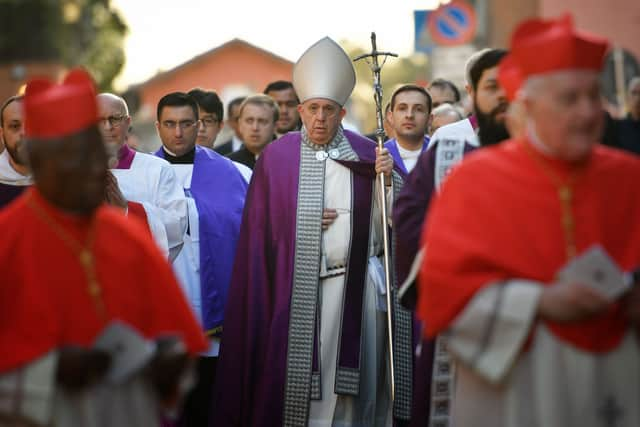Lent 2024: when does it start, what is it, meaning, Ash Wednesday dates, fasting ideas, end - how long is it?
and live on Freeview channel 276
Lent, a solemn and reflective season observed by millions worldwide, holds profound significance in the Christian calendar.
Commencing with Ash Wednesday and spanning 40 days, this period of self-examination and spiritual discipline culminates in the celebration of Easter.
Advertisement
Hide AdAdvertisement
Hide AdEven for non-Christians, Lent can be a period of change, with many people giving up indulgences or vices like chocolate and alcohol for at least the 40 day period.
But when exactly does Lent fall this year, how does it tie in with Easter, and what is the meaning behind the season? Here is everything you need to know about it.
What is Lent?
Lent is a significant period in the Christian calendar, observed by many various branches of the religion, including Catholics, Orthodox Christians and many Protestant communities.
A season of reflection, repentance and preparation leading up to Easter, Lent typically spans 40 days.
Advertisement
Hide AdAdvertisement
Hide AdThe word "Lent" itself is derived from the Old English word "lencten," which means springtime. This linguistic connection underscores the symbolic nature of Lent as a time of spiritual rebirth and renewal.
The 40 day duration of Lent holds significance, and in the Bible, the number 40 appears in various contexts, often associated with a period of testing, trial or preparation. For instance, Moses spent 40 days on Mount Sinai, and the Israelites wandered in the desert for 40 years.
In the New Testament, Jesus fasted and prayed in the wilderness for 40 days before beginning his ministry. Lent, therefore, symbolises a time of spiritual testing and preparation for the Easter celebration.
The 40 days do not include Sundays, as Sundays are considered "mini-Easters" – days of celebration and joy.
Advertisement
Hide AdAdvertisement
Hide Ad

How is Lent observed?
Central to the observance of Lent is the concept of fasting, self-denial and penance. Many Christians choose to give up a specific indulgence or habit during this period, such as certain foods, entertainment or vices, as a way of expressing solidarity with Jesus' sacrifice and practising self-discipline.
Many churches organise special services, such as Stations of the Cross, where believers meditate on the events leading to Jesus' crucifixion.
Almsgiving, or acts of charity, is another key aspect of Lent. The focus on self-denial and reflection extends to caring for others, particularly those in need, and Christians are encouraged to share their resources, time and compassion with the less fortunate.
As Lent progresses, it culminates in Holy Week, the final week leading up to Easter. Holy Week includes significant events such as Maundy Thursday, commemorating the Last Supper; Good Friday, marking Jesus' crucifixion; and Holy Saturday, a day of reflection and anticipation before the celebration of Easter Sunday.
Advertisement
Hide AdAdvertisement
Hide AdWhat can I give up for Lent?
Choosing what to give up for Lent is a personal decision and can vary based on individual circumstances and goals. Here are ten common examples of things that people often choose to give up during the Lenten season:
- Chocolate - A popular choice due to its widespread consumption and the perceived sacrifice of indulging in sweets.
- Alcohol - Abstaining from alcoholic beverages is a common Lenten sacrifice, reflecting a commitment to self-discipline and sobriety.
- Social Media - Many individuals opt to take a break from platforms like Facebook, Instagram or X (formerly known as Twitter) to refocus their attention on real-life relationships and reduce distractions.
- Fast Food - Giving up fast food or processed snacks aligns with the tradition of fasting and promotes healthier eating habits.
- Soda or Sugary Drinks - Abstaining from sugary beverages contributes to both personal health goals and the spirit of self-denial.
- Swearing or Negative Language - Some people choose to give up the use of certain words or expressions, promoting a more positive and respectful communication style.
- Television or Streaming Services - Cutting back on screen time can create space for more productive activities and foster a quieter, reflective atmosphere.
- Caffeine - Giving up coffee, tea or energy drinks can be a challenging but meaningful sacrifice for those looking to break a dependence on caffeine.
- Smoking - Lent provides an opportunity for individuals to work towards healthier habits by giving up smoking or other forms of tobacco use.
- Online Shopping - Abstaining from unnecessary online purchases emphasises the importance of simplicity and mindful consumption.
When is Lent 2024?
In 2024, Lent will begin on Wednesday 14 February (this will be Ash Wednesday), and come to an end on Thursday 28 March - Maundy Thursday.
Comment Guidelines
National World encourages reader discussion on our stories. User feedback, insights and back-and-forth exchanges add a rich layer of context to reporting. Please review our Community Guidelines before commenting.
